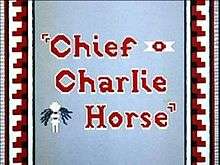Chief Charlie Horse
Chief Charlie Horse is the 68th animated cartoon short subject in the Woody Woodpecker series. Released theatrically on May 7, 1956, the film was produced by Walter Lantz Productions and distributed by Universal International.[1]
| Chief Charlie Horse | |
|---|---|
 | |
| Directed by | Paul J. Smith |
| Produced by | Walter Lantz |
| Story by | Jack Cosgriff |
| Starring | Grace Stafford Dal McKennon |
| Music by | Clarence Wheeler |
| Animation by | Robert Bentley Herman R. Cohen Ray Abrams Art Landy |
| Color process | Technicolor |
Production company | |
| Distributed by | Universal International |
Release date | May 7, 1956 |
Running time | 6' 13" |
| Country | United States |
| Language | English |
Plot
Woodcarver Woody Woodpecker specializes in wooden Indians and wooden nickels who is hard at work on his latest creation: a life-sized statue of an Indian chief, which, by coincidence, is an exact likeness of notorious bandit Chief Charlie Horse. The telephone rings, and a customer asks if Woody has any wooden Indians for sale. Woody replies that he has one he has just finished.
Meanwhile, outside Woody's shop, all is confusion as the sheriff and his posse are trying desperately to capture Chief Charlie Horse. They cart the wooden Indian away, believing him to be the real thing. Woody believes that the sheriff is the customer who telephoned, and he thinks that he has been slightly overpaid. Now Chief Charlie Horse himself enters Woody's shop, seeking a hiding place. The sheriff, realizing that he made an error, returns to Woody's shop to search for the live Indian. Charlie hides the statue in a crate, and then, when the sheriff enters the room, he poses as the wooden Indian. Both Woody and the sheriff fall for the trick and believe that Charlie has gotten away. The sheriff takes back the reward money, and Woody starts to work on his model again. When Woody has finished, he tacks a "sold" sign on the carving, and Charlie lets out a resounding yell. Thinking that the real Indian is the wooden Indian, the sheriff throws Charlie out of jail.
References
- Lenburg, Jeff (1999). The Encyclopedia of Animated Cartoons. Checkmark Books. pp. 157–158. ISBN 0-8160-3831-7.
- Cooke, Jon, Komorowski, Thad, Shakarian, Pietro, and Tatay, Jack. "1956". The Walter Lantz Cartune Encyclopedia. Knothead & Splinter///